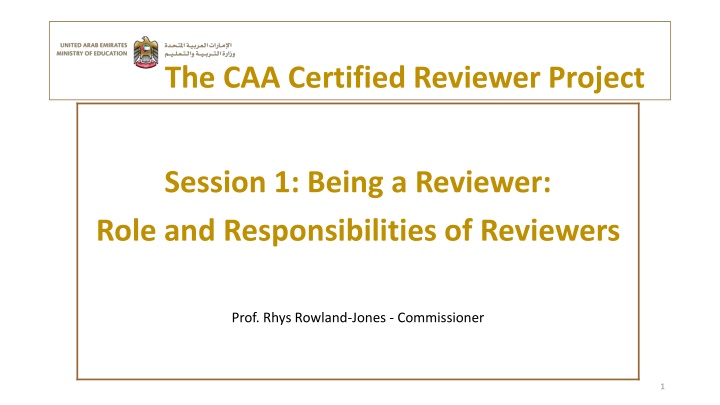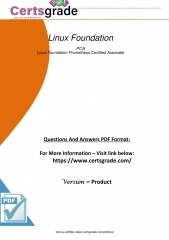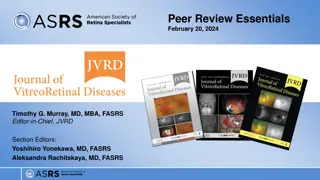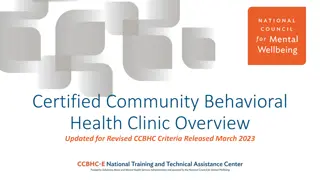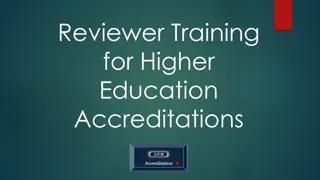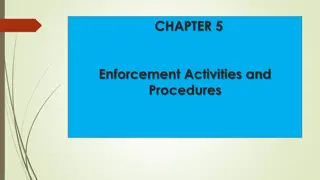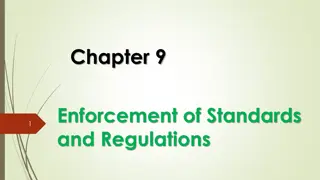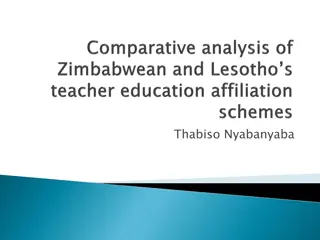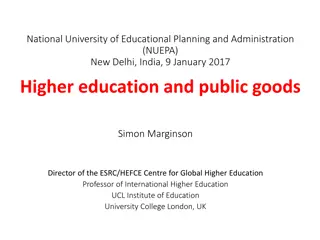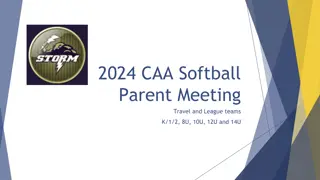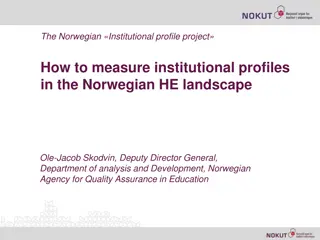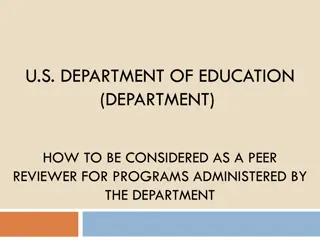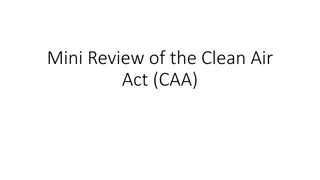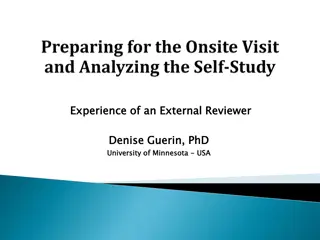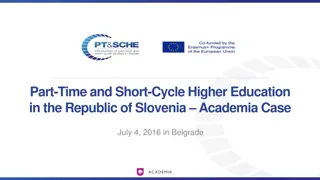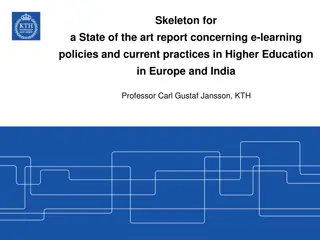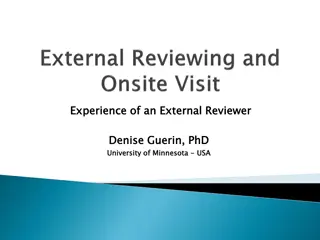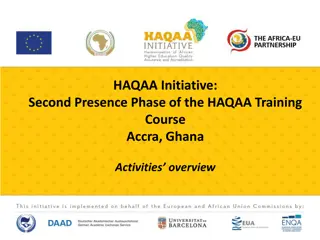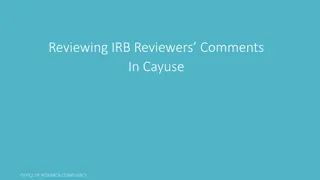The CAA Certified Reviewer Project: Ensuring Quality in Higher Education
The CAA Certified Reviewer Project focuses on establishing standards and quality assurance in UAE higher education. By setting expectations for institutions and students, ensuring international quality levels, and maintaining national standards, the project aims to enhance confidence in licensed institutions and accredited programs. The initiative involves developing national standards, managing licensure and accreditation applications, and aligning methods to the established standards.
Download Presentation

Please find below an Image/Link to download the presentation.
The content on the website is provided AS IS for your information and personal use only. It may not be sold, licensed, or shared on other websites without obtaining consent from the author.If you encounter any issues during the download, it is possible that the publisher has removed the file from their server.
You are allowed to download the files provided on this website for personal or commercial use, subject to the condition that they are used lawfully. All files are the property of their respective owners.
The content on the website is provided AS IS for your information and personal use only. It may not be sold, licensed, or shared on other websites without obtaining consent from the author.
E N D
Presentation Transcript
The CAA Certified Reviewer Project Session 1: Being a Reviewer: Role and Responsibilities of Reviewers Prof. Rhys Rowland-Jones - Commissioner 1
CAA Expectations EACH PARTICIPANT IS EXPECTED TO ARRIVE HAVING READ THE APPROPRIATE DOCUMENTATION FOR DISCUSSION ON THAT DAY. EACH PARTICIPANT IS EXPECTED TO BE ON TIME FOR THE SESSIONS AND TO FULLY ENGAGE IN THE ACTIVITIES AND DISCUSSIONS. EACH PARTICIPANT IS EXPECTED TO BEHAVE IN A PROFESSIONAL MANNER THROUGHOUT THE PROGRAM E.G. NO MOBILE TELEPHONES. EACH PARTICIPANT IS EXPECTED TO COMPLETE THE ASSIGNED WORK SCHEDULED FOR OUTSIDE THE SESSIONS. EACH PARTICIPANT IS EXPECTED TO COME PREPARED FOR THE SESSIONS WITH APPROPRIATE EQUIPMENT FOR THE DAY.
make clear what higher education providers are required to do Make What we do at the CAA Establish what HE providers and Students can expect of each other, and what the general public can expect of them Establish assure the standards and quality of UAE higher education. Assure
provides measures of quality that all institutions must meet for licensure and program accreditation Why what we do is important ensures that the colleges and universities of the UAE operate at international levels of quality that reflects a consensus within the international higher education community on the essential characteristics required of institutions to achieve continuous improvement. gives students, graduates, their families, and the UAE public confidence that licensed institutions and accredited programs will provide the quality of higher education that they expect and deserve.
Develop national Standards for Institutional Licensure and Accreditation Maintain national register of licensed institutions and programs https://www.caa.ae/caa/DesktopModules/Institutions.aspx https://www.caa.ae/caa/DesktopModules/Institutions.aspx How we do it Manage applications for Licensure and Accreditation Ensure reviews are carried out to best national and international standards Provide workshops and development
methods and criteria are aligned to the Standards 2019 reliable, consistent, fair and valid inclusive and equitable. Guiding Principles explicit and transparent. purposeful and supports the learning process. efficient and manageable.
Reviewing is a time-intensive process preparation before the event, and writing a review report is very intensive Reviewers: ensure the rigorous standards of the program accreditation or the institutional licensure uphold the integrity of the CAA by identifying non-compliance, and helping to maintain the quality of higher education in the UAE. fulfil a sense of obligation / service to the academic community. establish relationships with reputable institutions and colleagues. can help prevent ethical breaches by identifying plagiarism, research fraud and other problems by dint of their familiarity with the subject area. reciprocate professional courtesy, as authors and reviewers are often interchangeable roles as reviewer, researchers "repay" the same consideration they receive as authors. Reviewers
Observation and Understanding You will be expected to read a considerable amount of documentation on any review Will this be the actual state of affairs in the institution or of the program of study? How will you know? Can you interpret the documents to find out? How observant are you? https://www.youtube.com/watch?v=KB_lTKZm1Ts
CAA Certified Reviewer Core Competencies Technical Understands the Standards (2019) it s structure, content, dynamics and linkages to the Supplementary Guidance and Procedural Manuals. Higher Education Management Understands the Key Information about the organisation being assessed and uses it effectively to produce relevant, value adding analysis Teamwork & Professionalism Contributes effectively as a review team member conducting themselves at all times both professionally and with integrity. Communications, Interpersonal & Interviewing Communicates clearly and accurately in both spoken and written English and demonstrates effective interpersonal and interviewing skills. Analytical Assimilates and understands relevant information and data related to the higher education institution being assessed, using it to produce clear, accurate and insightful analysis at both macro (big picture) and micro (detail) levels. Report Writing and Presentation Produces and delivers clear, accurate and value adding reports, both in written and oral form.
Participant Evaluation BEING A CERTIFIED REVIEWER IS NOT MERELY A TECHNICAL EXERCISE BUT IS A DEMANDING TASK REQUIRING A BALANCE OF THE COMPETENCIES LISTED ABOVE COUPLED WITH A COMMITMENT TO TIMELY AND PROFESSIONAL PERFORMANCE. THROUGHOUT THE TRAINING AND REVIEW PROCESS INFORMATION WILL BE CONTINUOUSLY GATHERED ON PARTICIPANTS AND THEIR PERFORMANCE, FOR THE SAKE OF BOTH EVALUATING THEM AND CONTINUOUSLY IMPROVING THE PROCESS IT IS ACKNOWLEDGED THAT THIS DATA IS PERSONALLY SENSITIVE TO THE INDIVIDUAL CONCERNED. ALL INVOLVED WILL TREAT THIS DATA WITH THE UTMOST CONFIDENTIALITY AND WILL USE IT SOLELY WITHIN THE TERMS OF REFERENCE OF THIS CAA CODE OF PRACTICE. NOT EVERYONE WILL BE INVITED BACK.
Individual Assessment Task Critically discuss how you could effectively evaluate an institutions approach to assessment: Needed: (a) An overview of your approach And (b) An indication of some documents you would like to see
Guiding Principles which underpin assessment Guiding Principles which underpin assessment Assessment methods and criteria are aligned to learning outcomes and teaching activities. Assessment is reliable, consistent, fair and valid. Assessment design is approached holistically. Assessment is inclusive and equitable. Assessment is explicit and transparent. Assessment and feedback is purposeful and supports the learning process. Assessment is timely. Assessment is efficient and manageable. Students are supported and prepared for assessment. Assessment encourages academic integrity
